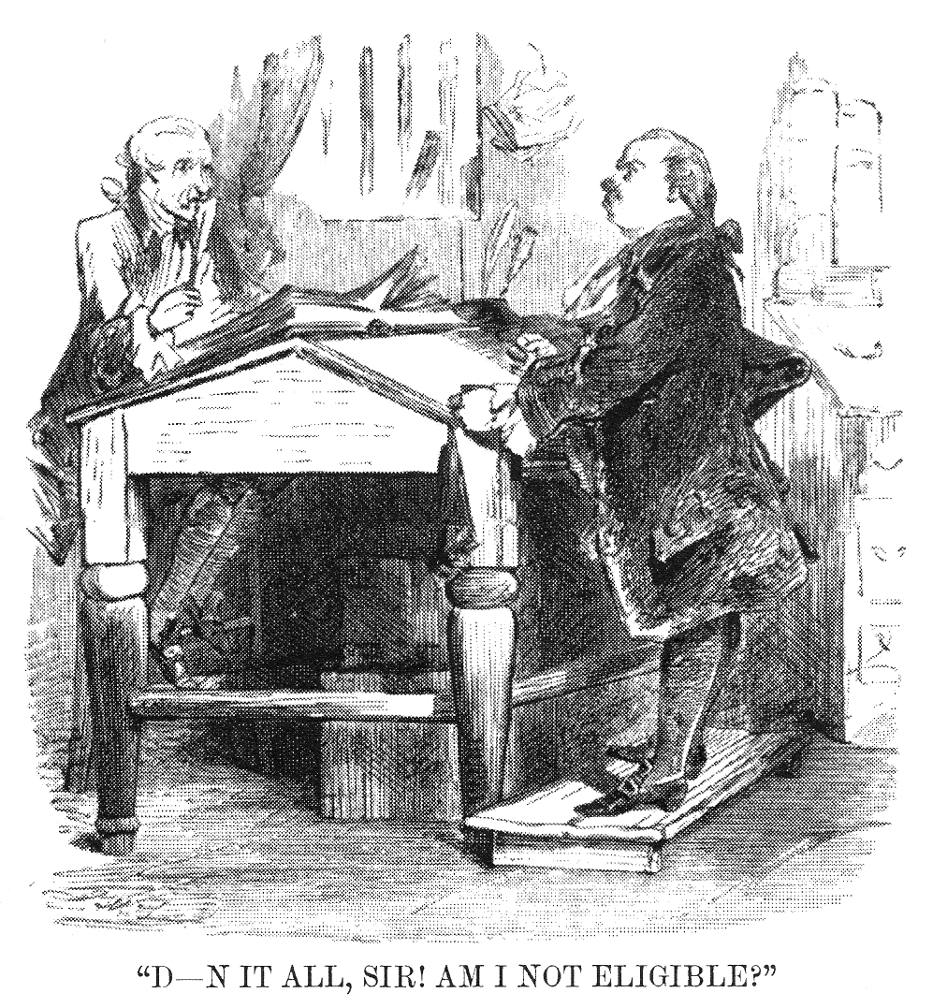
"D__n it all, Sir! Am I not eligible?" by John McLenan. Illustration for Dickens's A Tale of Two Cities, Book the Second, "The Golden Thread," Chapter XII, "The Fellow of Delicacy," 477. The pompous attorney, Carton's partner, Stryver, angrily responds to Jarvis Lorry's reaction to his announcement that he is going to offer his hand in marriage to Lucie Manette. 8.4 cm high by 8 cm wide (3 ¼ by 3 ⅛ inches. Harper's Weekly (23 July 1859): this instalment appeared in UK on Saturday, 16 July, in All the Year Round. [Click on the image to enlarge it.]
Passage Ilustrated
It was Stryver's grand peculiarity that he always seemed too big for any place, or space. He was so much too big for Tellson's, that old clerks in distant corners looked up with looks of remonstrance, as though he squeezed them against the wall. The House itself, magnificently reading the paper quite in the far-off perspective, lowered displeased, as if the Stryver head had been butted into its responsible waistcoat.
The discreet Mr. Lorry said, in a sample tone of the voice he would recommend under the circumstances, "How do you do, Mr. Stryver? How do you do, sir?" and shook hands. There was a peculiarity in his manner of shaking hands, always to be seen in any clerk at Tellson's who shook hands with a customer when the House pervaded the air. He shook in a self-abnegating way, as one who shook for Tellson and Co. . . .
"I am going," said Mr. Stryver, leaning his arms confidentially on the desk: whereupon, although it was a large double one, there appeared to be not half desk enough for him: "I am going to make an offer of myself in marriage to your agreeable little friend, Miss Manette, Mr. Lorry."
"Oh dear me!" cried Mr. Lorry, rubbing his chin, and looking at his visitor dubiously.
"Oh dear me, sir?" repeated Stryver, drawing back. "Oh dear you, sir? What may your meaning be, Mr. Lorry?"
"My meaning," answered the man of business, "is, of course, friendly and appreciative, and that it does you the greatest credit, and — in short, my meaning is everything you could desire. But — really, you know, Mr. Stryver — " Mr. Lorry paused, and shook his head at him in the oddest manner, as if he were compelled against his will to add, internally, "you know there really is so much too much of you!"
"Well!" said Stryver, slapping the desk with his contentious hand, opening his eyes wider, and taking a long breath, "if I understand you, Mr. Lorry, I'll be hanged!"
Mr. Lorry adjusted his little wig at both ears as a means towards that end, and bit the feather of a pen.
"D__n it all, sir!" said Stryver, staring at him, "am I not eligible?"
"Oh dear yes! Yes. Oh yes, you're eligible!" said Mr. Lorry. "If you say eligible, you are eligible."
"Am I not prosperous?" asked Stryver.
"Oh! if you come to prosperous, you are prosperous," said Mr. Lorry.
"And advancing?"
"If you come to advancing you know," said Mr. Lorry, delighted to be able to make another admission, "nobody can doubt that."
"Then what on earth is your meaning, Mr. Lorry?" demanded Stryver, perceptibly crestfallen. . . .
"I wouldn't go on such an object without having some cause to believe that I should succeed." [Book the Second, "The Golden Thread," Chapter XII, "The Fellow of Delicacy," 477]
Comment
Compare this small-scale woodblock illustration to Phiz's steel-engraving Mr. Stryver at Tellson's Bank (August 1859). Whereas Phiz's treatment is comprehensive, giving the viewer a sense of the counting-house at the bank, McLenan's focuses on the figure of the self-satisfied, entitled, and combative criminal attorney.
Other Illustrated Editions (1859-1910)
- Hablot K. Brown or 'Phiz' (16 illustrations, 1859)
- Sol Eytinge, Junior (8 illustrations, 1867)
- Fred Barnard (25 illustrations, 1874)
- A. A. Dixon (12 illustrations, 1905)
- Harry Furniss (32 illustrations, 1910)
Related Material
- John McLenan's Thirty-One Headnote Vignettes for A Tale of Two Cities in Harper's Weekly (7 May — 3 December 1859)
- McLenan's and Phiz's Illustrations for
A Tale of Two Cities (1859): A Correspondence?
- Images of the French Revolution from Various Editions of A Tale of Two Cities (1859-1910)
- French Revolution
- Victorian Images of the French Revolution
- "A Tale of Two Cities (1859): A Model of the Integration of History and Literature"
Bibliography
Allingham, Philip V. "Charles Dickens's A Tale of Two Cities (1859) Illustrated: A Critical Reassessment of Hablot Knight Browne's Accompanying Plates." Dickens Studies. 33 (2003): 109-158.
Dickens, Charles. A Tale of Two Cities. Illustrated by John McLenan. Harper's Weekly: A Journal of Civilization, 7 May through 3 December 1859.
_______. A Tale of Two Cities. Illustrated by Phiz (Hablot Knight Browne). London: Chapman and Hall, November 1859.
_______. A Tale of Two Cities. Illustrated by Sol Eytinge, Jr. The Diamond Edition. 16 vols. Boston: Ticknor and Fields, 1867. XIII.
_______. A Tale of Two Cities. Illustrated by Fred Barnard. The Household Edition. 22 vols. London: Chapman and Hall, 1874. VIII.
_______. A Tale of Two Cities: A story of the French Revolution. Project Gutenberg e-text by Judith Boss, Omaha, Nebraska. Release Date: September 25, 2004 [EBook #98].
_______. A Tale of Two Cities. With illustrations by John McLenan and Rowland Wheelwright. Orinda, Cal.: Sea Wolf Press, 2021.
Created 27 November 2007
Last modified 17 November 2025